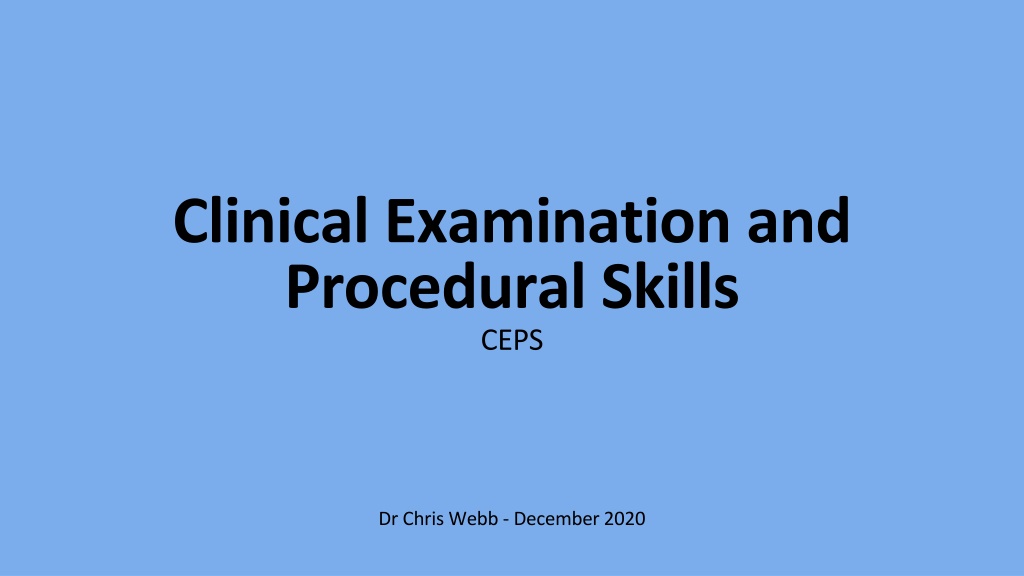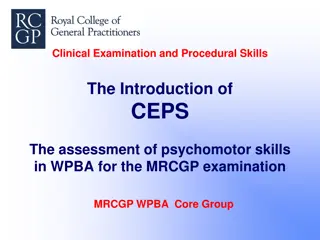Proficient Clinical Examination and Procedural Skills in General Practice
Proficient Clinical Examination and Procedural Skills (CEPS) are essential for effective general practice. Trainees must gather evidence regularly and reflect on their progression with word descriptors. Requirements for CCT include 5 mandatory intimate examinations observed by a suitably trained professional. The definition of intimate examinations varies, and there is no set number required; competence in CEPS must satisfy the ES. The standard of examination needed is that of an independent fully qualified GP, tailored to the clinical context.
Download Presentation

Please find below an Image/Link to download the presentation.
The content on the website is provided AS IS for your information and personal use only. It may not be sold, licensed, or shared on other websites without obtaining consent from the author. Download presentation by click this link. If you encounter any issues during the download, it is possible that the publisher has removed the file from their server.
E N D
Presentation Transcript
Clinical Examination and Procedural Skills CEPS Dr Chris Webb - December 2020
Introduction Proficient Clinical Examination and Procedural Skills are fundamental to effective general practice Relevant evidence for this Capability needs to be gathered regularly throughout each review period and recorded in the trainee s Portfolio As with the other Capabilities there are sets of word descriptors to help them reflect on their progression as they acquire these skills
What is required to CCT? The 5 mandatory intimate examinations A suitably trained professional needs to observe and document performance on a CEPS evidence form. If this is another doctor they must be at ST4 level or above, or an SAS equivalent. If the colleague is another health professional, such as a specialist nurse, they must confirm their role and training so that the ES can be satisfied that they have been appropriately trained. The trainee may also decide to write a separate log entry on any of these specific skills A range of additional CEPS relevant to General Practice
What constitutes an intimate examination? No agreed definition The 5 examinations for which evidence of competence is required by the GMC are generally accepted examples of intimate examinations but there are many others For instance, the competent examination of the eye with an ophthalmoscope is considered by many, if not most, patients to be an intimate examination, especially as it requires the examination room to be darkened Ultimately it is the individual patient who determines what is intimate or invasive for them and this will be determined by a number of possible factors including their prior experiences, religion and cultural background
How many are required? No set number There needs to be enough to demonstrate, to the ES s satisfaction, their competence in CEPS
What is the standard of examination required? That of an independent fully qualified GP As well as the technical aspects of examination and the ability to recognise abnormal physical signs, it includes the choice of examination best suited to the clinical context. For instance, a competent GP very rarely performs an extensive neurological examination but will perform a limited neurological examination as determined by the history taken from the patient
Do intimate examinations need to be repeated? No, if the ES is satisfied that the evidence the trainee has provided for 1 of the 5 intimate examinations as required by the GMC is sufficient this does not need to be repeated It is important that the evidence is recorded in such a way that the trainee can remember where it is The easiest ways to do this is to use the CEPS forms At the final review before a Certificate of Completion of Training (CCT) is recommended the ES will need to answer a specific question in relation to these examinations
Completion of CEPS These can be completed in a variety of ways: CEPS evidence form (in the evidence section of the Portfolio) Learning logs (there is a filter for CEPS entries) MiniCEX COT
Clinical Examination and Procedural Skills This is about clinical examination and procedural skills. By the end of training, the trainee must have demonstrated competence in 5 mandatory skills and a range of other examination and skills relevant to General Practice Indicators of Potential Underperformance Needs Further Development Competent Excellent Chooses examinations appropriately targeted to the patient s problem(s) Proficiently identifies and performs the scope of examination necessary to investigate the patient s problem(s) Chooses examinations in line with the patient s problem(s) Not a level below NFD Patient shows no understanding as to the purpose of examination Fails to examine when the history suggests conditions that might be confirmed or excluded by examination Inappropriate over examination Fails to obtain informed consent for the procedure Patient appears unnecessarily upset by the examination Has a systematic approach to clinical examination and able to interpret physical signs accurately Uses a step-wise approach to examination, basing further examinations on what is known already and is later discovered Identifies abnormal signs Suggests appropriate procedures related to the patient s problem(s) Varies options of procedures according to circumstances and the preferences of the patient Demonstrates a wide range of procedural skills to a high standard Observes the professional codes of practice including the use of chaperones Identifies and reflects on ethical issues with regard to examination and procedural skills Engages with quality improvement initiatives with regard to examination and procedural skills Recognises the verbal and non- verbal clues that the patient is not comfortable with an intrusion into their personal space especially the prospect or conduct of intimate examinations. Is able to help the patient to accept and feel safe during the examination Arranges the place of the examination to give the patient privacy and to respect their dignity. Examination is carried out sensitively and without causing the patient harm Recognises and acknowledges the patients concerns before and during the examination and puts them at ease Performs procedures and examinations with the patient s consent and with a clinically justifiable reason to do so Shows awareness of the medico- legal background, informed consent, mental capacity and the best interests of the patient Helps to develop systems that reduce risk in clinical examination and procedural skills




